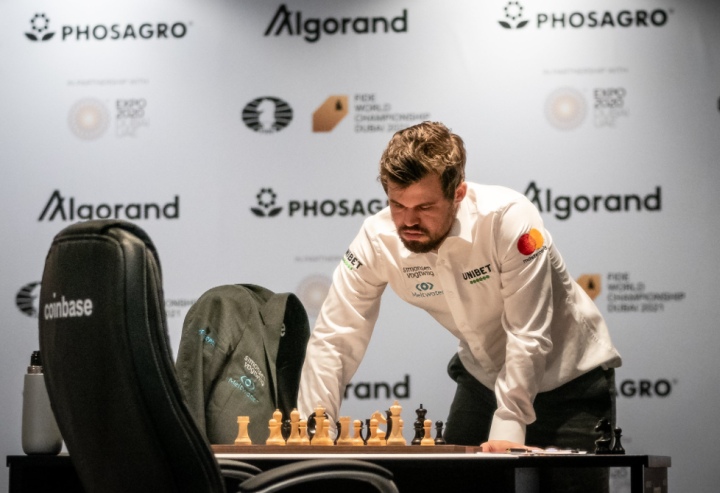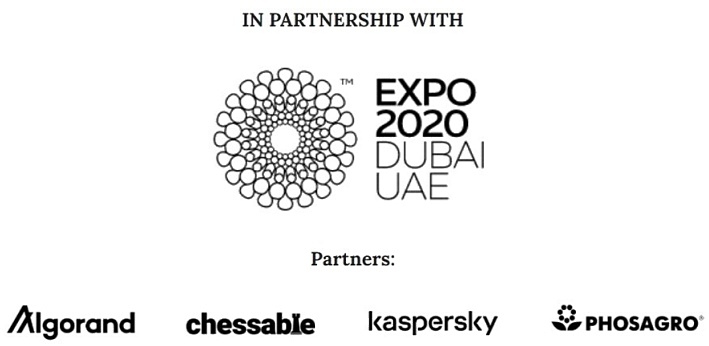A quick look back
Yesterday history was made, with the longest game ever in the world championship ending in a 136-move victory for defending champion Magnus Carlsen. The marathon game lasted nearly eight hours and broke the deadlock of five preceding draws. Although the result could be easily ascribed to the champion’s legendary ability to squeeze slow wins from nano-advantages, the dramatic game raises more complex talking points, examining it the morning after.
It takes two
Even though several key in-game choices, and both players, indicated that this record tussle flared up thanks to mutual efforts, in the second-hand excitement and adrenaline, it was easy to overlook challenger Ian ‘Nepo’ Nepomniachtchi’s role in the epic struggle. Despite playing with the statistical disadvantage of the black pieces, Ian was clearly feeling confident enough with his form and position to try to create winning chances once he had neutralised Carlsen’s first move initiative.
Perhaps emboldened by Magnus’ massive deficit on the clock, Nepo chose to further sharpen play with his 25th move, which he said was ‘unnecessary’ but created complications and chaos without great risk.
Carlsen was taking minor chances of his own trying to keep the position alive and was slightly surprised to see his opponent doing the same: “I felt like we were both risking a bit, but I thought maybe Black was risking a bit more. And it meant that we would get a serious struggle that I was happy with.”

The champion eventually emerged the winner after an immense technical grind, with both players left with minimal time for the last 75 moves of the game. The players traded blows, missed opportunities, and fierce ambition.
The result aside, the game revealed that despite very conservative appearances in his early white games, the challenger is lacking neither confidence nor ambition. He has repeatedly created chances to rock the champion – but has yet to convert an edge.
Wolf in sheep’s clothing
A discussion point that will probably only be resolved with hindsight is whether Nepomniachtchi started the match with a strategy to frustrate Carlsen, which his predecessor, and assistant here, Sergey Karjakin, seemed to employ in his New York 2016 title match. Experts have debated whether Ian’s slightly hesitant approach when playing white might be due to an ill-fitting match plan and that he may be itching to let loose his more aggressive style.
It is too early to draw conclusions, but his attitude at the board and demeanour off suggest that we may soon see a more ‘typical’ Nepomniachtchi, especially since he now has no choice but to crank up the chaos factor to fight back – the only question being when.

Looking ahead
There are now eight games left. Plenty of time to mount a comeback for Nepomniachtchi, but he needs to find a tricky balance of timing and risk assessment to defeat the champion without falling further behind. An indicator of how tough this can be is Carlsen’s world record of 125 consecutive games without defeat at the elite level, set over a period of 26 months.
What makes this match special is that Nepomniachtchi has one of the best one-on-one records against Carlsen, even if his edge was set when they were battling pre-teen prodigies.
Game seven
Both players emerged promptly to their call to arms today, and the ceremonial first move is executed by Andrey Guryev, the CEO of PhosAgro, a major FIDE partner and sponsor. He is accompanied onstage by Denis Manturov, the Minister of Industry and Trade of the Russian Federation. Guryev’s hesitant but correct guess of 1.e4 is allowed to remain on the board, Ian only adjusts it slightly, and they are off.
Ringside view
One trend that cannot be disputed is the Carlsen suit. So far, Magnus appears to be alternating apparel in sync with his colours in the game – wearing a dark suit and white shirt when playing black and a light suit with a black shirt when playing white.

Magnus also has a regular cycle of body language for the start of the game. As he plays and writes down the first few moves, he props his head up lazily on his left hand. A little later, his left elbow lifts off the table, and the subsequent flurry of moves is executed with his left hand screening his eyes. Once it is time to have a real thing, he bends forward and grasps his head between both hands.
Ian flits around early, often preferring to disappear backstage if there is the least hesitation in his opponent’s reply. Carlsen sank into thought over his 12th move, and this signalled a change of pace as more profound decisions began to arise. Ian remained offstage for five minutes while his time was running, but when he returned, he stayed. Afterwards, he would tell the press that when offstage, he is sitting on a sofa, analysing the position onscreen, a familiar feeling after long months of playing online chess on a computer.
Post-marathon
After the immense exertions of game six, there is a sense of caution and fatigue today. The battleground is familiar from all of Nepomniachtchi’s white games in Dubai, and Carlsen aims for safety, playing to neutralise the first move and reach very solid equality. The pace is slow, with fear of error seemingly foremost in their minds.

The challenger’s long think on move 20 created the possibility of wholesale material exchanges, which commentator Judit Polgar, the strongest woman player in history, called a silent draw offer. In the following moves, the board was emptied, and a draw was the inevitable result, with the players going through the motions to reach move 40 when peace can be agreed without a repetition of moves.
Immediately after the game, Carlsen admitted that energy levels were a factor after yesterday’s marathon. “I couldn’t sleep yesterday; I was way too excited,” Carlsen said before saying he assumed it was probably even worse for his opponent. He also said he expected care from Nepomniachtchi today since it would be rash for him to overreact and risk a ‘tilt’. Ian said that his levels were ‘obviously not at the highest point’, but that was ‘part of the job’.
Press conference
The post-game press conference was nearly as subdued as the game, with curiosity tending to focus on the impact of the previous day’s exertions. The challenger had a few snappy replies: when asked when he was going to attack, he smiled ‘When the time comes.’ Quizzed about who had given him comfort or a pep talk after game six, Nepomniachtchi raised an eyebrow and said: “I think I am generally mentally strong.”

The eighth game takes place tomorrow, 5 December, with champion Magnus Carlsen having the advantage of the first move.
FACT SHEET, Game 7, FIDE (International Chess Federation) World Championship:
White: Ian Nepomniachtchi
Black: Magnus Carlsen
Result: ½-½
Match score: 3-4 in favour of Carlsen
Game length: 41 moves
Opening: Ruy Lopez/Spanish
Variation: Anti-Marshall
Text: Jonathan Tisdall, Press Officer press@fide.com
Photo: Niki Riga and Eric Rosen
Official website of FIDE World Championship Dubai 2021


